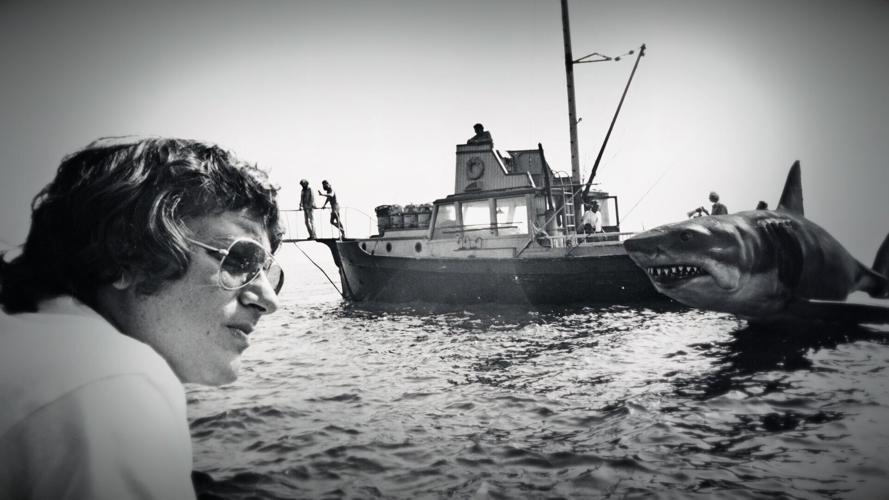ŌĆ£JawsŌĆØ isnŌĆÖt a monster movie.
ItŌĆÖs a people movie, says Laurent Bouzereau, the director of ŌĆ£Jaws @ 50,ŌĆØ a documentary about the blockbuster.
ŌĆ£ItŌĆÖs relatable and feels extremely timeless,ŌĆØ Bouzereau says. When director Steven Spielberg doesnŌĆÖt show the shark in the beginning, ŌĆ£that stimulates your imagination and youŌĆÖre fully participating in the action. There are a lot of benchmarks and lessons to get from it, if you want to be a storyteller.ŌĆØ

Director Steven Spielberg on the set of "Jaws" with the mechanical shark in the background.┬Ā
Spielberg, he says, is a master at the form and, as ŌĆ£JawsŌĆØ demonstrated, leaned into other ways of telling that story when things like the mechanical shark didnŌĆÖt work.
Offered the opportunity to quit the film, Spielberg resisted. ŌĆ£I know thereŌĆÖs a great movie there,ŌĆØ he told a studio head. ŌĆ£ItŌĆÖs a rite of passage.ŌĆØ
People are also reading…
ŌĆ£JawsŌĆØ was also a rite of passage for the director, Bouzereau says. ŌĆ£ItŌĆÖs a great metaphor for art in general. If you survive the making of ŌĆśJaws,ŌĆÖ youŌĆÖre in.ŌĆØ

Steven Spielberg, director of "Jaws" and Director Laurent Bouzereau are pictured during an interview for National Geographic's "Jaws @ 50: The Definitive Inside Story."
In ŌĆ£Jaws @ 50,ŌĆØ the documentarian talks to many of the filmŌĆÖs participants and demonstrates how it affected pop culture, circa 1975.
As big as it is today┬ĀŌĆö ŌĆ£JawsŌĆØ is considered the first blockbuster by many ŌĆö ŌĆ£JawsŌĆØ was a nightmare during the filming process.
In addition to studio personnel nagging him about cost overruns, Spielberg had to deal with temperamental actors, weather changes and a community of extras wondering what was happening with the movie shot in their town.
Toss in the anticipation of those who had read Peter BenchleyŌĆÖs best-seller and there were a lot of detractors who could have taken Spielberg down. He persevered and went on to make some of the most iconic films in screen history.

Steven Spielberg, director of "Jaws," films the mechanical shark on set.┬Ā
ŌĆ£Close Encounters of the Third Kind,ŌĆØ his follow-up film, was a dream project. ŌĆ£On the heels of ŌĆśJaws,ŌĆÖ he was really into that,ŌĆØ Bouzereau says. ŌĆ£The (ŌĆśJawsŌĆÖ) sequels were not really in his orbit because the path of his storytelling was guiding him to a certain house.ŌĆØ
In the documentary, Spielberg admits the success of ŌĆ£JawsŌĆØ gave him final cut on all the rest of his movies ŌĆö a privilege few directors get.
Talking with a generation of filmmakers inspired by Spielberg, Bouzereau says they owe him a debt of gratitude, often for different reasons. ŌĆ£I wanted this new generation of filmmakers (in the documentary) because ŌĆśJawsŌĆÖ is passed on from generation to generation.ŌĆØ
Guillermo del Toro, for example, is obsessed with monsters ŌĆö and liked that aspect of ŌĆ£Jaws.ŌĆØ Steven Soderbergh ŌĆ£is obsessed with making movies really fast and economically.ŌĆØ
Others were drawn to the filmŌĆÖs ability to draw a huge crowd.
ŌĆ£The thing thatŌĆÖs unique about ŌĆśJawsŌĆÖ is the sudden cultural phenomenon that it became,ŌĆØ Bouzereau say. ŌĆ£Everybody was humming the score. (There were skits) on ŌĆśSaturday Night Live.ŌĆÖ There were political cartoons and a book on the making of ŌĆśJaws,ŌĆÖ which was not something that was done at the time. There were baseball caps and T-shirts and beach towels. People wanted to own it as an experience.ŌĆØ
ŌĆ£JawsŌĆØ created a template that ŌĆ£Star WarsŌĆØ was able to maximize just two years later.
Now, a summer doesnŌĆÖt seem complete without a film that becomes part of the cultural zeitgeist.
ŌĆ£Jaws,ŌĆØ Bouzereau says, is a story of survival, perseverance and conviction. Like the three men trying to slay the monster, Spielberg had his own monsters. ŌĆ£ItŌĆÖs one of those rare instances where the experience of making it is very much the experience of the actual story.ŌĆØ
ŌĆ£Jaws @ 50: The Definitive Inside Story,ŌĆØ which features interviews with Spielberg, actors, production personnel and critics, airs July 10 on National Geographic and streams on Disney+ and Hulu.
















